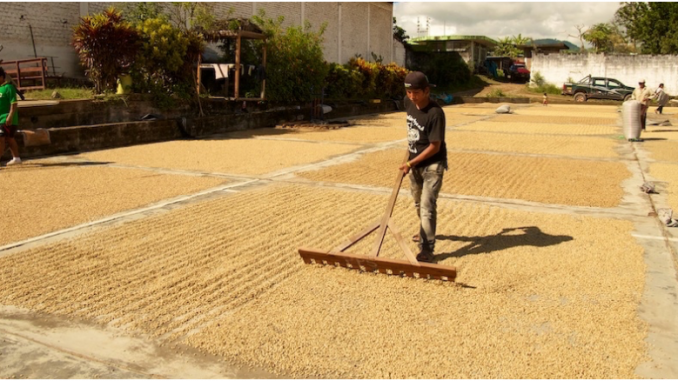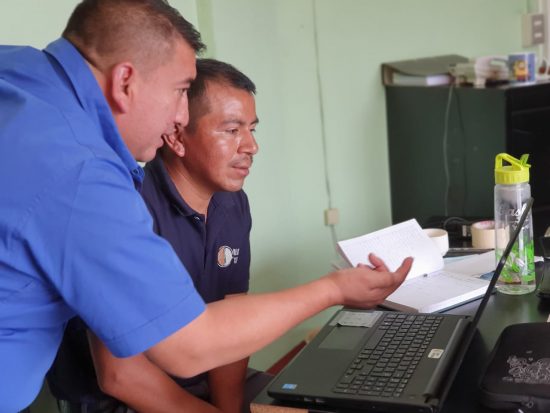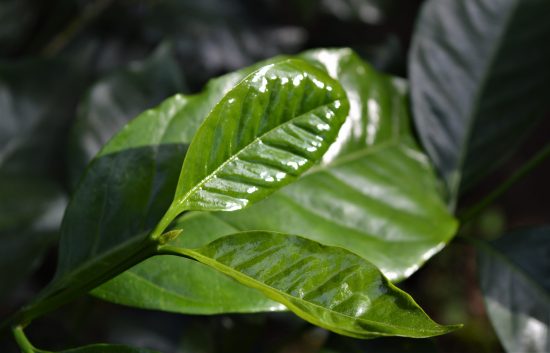
The pilot, run by several organizations and based in three coffee-producing countries, is testing the use of the Cool Farm Tool to help farmers mitigate their climate risk.
BY CHRIS RYAN
BARISTA MAGAZINE ONLINE
Cover photo courtesy of Root Capital
The climate crisis is posing immense, pressing challenges to the future of many crops in global agriculture, including coffee. No link in the coffee supply chain is threatened more imminently by the changing climate than producers, who are watching their surroundings change before their eyes.
Stakeholders throughout the coffee sector have been working on a variety of initiatives to help coffee producers tackle the changing climate. Among the newest is the Coffee Farm Tool, a new digital carbon calculation application that is being piloted on organic coffee farms in Guatemala, Honduras, and Peru. The tool is designed to enable farmers to track and understand the environmental impact of their production and determine the best organic practices for climate resiliency and crop health.
The Coffee Farm Tool project comes from four organizations—Cooperative Coffees, Root Capital, Sustainable Food Lab, and The Chain Collaborative—and is being tested at six organic coffee cooperatives: Manos Campesinas in Guatemala, Café Orgánico Marcala (COMSA) in western Honduras, and Sol y Café, CENFROCAFE, Norandino, and CAC Pangoa in Peru.

The tool, originally developed at Scotland’s University of Aberdeen in partnership with Unilever and Sustainable Food Lab, uses a series of drop-down menus that allow farmers to input data about their farming practices and receive immediate feedback on their environmental impact, enabling them to evaluate sustainability at every step of production. Farmers can also see the impact of new practices by entering new data and assessing the potential changes of those new inputs as it relates to net carbon capture. This aids in decision-making processes, as farmers are able to see in real time the sequestration potential of one practice over another.
How will farmers discover options for these new inputs? Elizabeth Teague, Root Capital’s climate resilience initiative lead, says the Cool Farm Tool pilot is doing farmer-by-farmer analysis of the partnering cooperatives to identify farming practices that result in a smaller carbon footprint. “We’ll share results with cooperatives and farmers to promote scaled adoption of these low-carbon practices by the larger membership base,” Elizabeth says. “The cooperatives’ agronomic extension teams will be critical in these efforts, and some are receiving agronomic and climate resilience advisory services from Root Capital to build their capacity to undertake this work.”
One of the most exciting things about the Cool Farm Tool project, according to Monika Firl, director of sustainability at Cooperative Coffees, is that it allows farmers to play a leadership role in mitigating climate change. “We’ve seen with our own eyes the positive environmental impact that a well-designed, agroforestry coffee field can have in terms of soil regeneration, increased biodiversity, water retention, disease suppression, and productivity,” she says. “But now with the Cool Farm Tool, we’re also able to finally quantify the levels of carbon sequestration in these fields, and in turn offer environmental service payments in the form of a carbon-premium to the farmers doing this hard work. And hopefully, this will incentivize other coffee farmers to implement similar best carbon-farming practices in their own fields … and ideally, other traders and roasters to also reward that work.”

The farmers are also excited to play a key role in exploring ways to mitigate their climate impact through the Cool Farm Tool. “We are part of the solution,” says Fernando Aguirre, a technical assistant and forestry engineer at Sol y Café in Northern Peru, in a press release. “We always have been, and at the same time we are aware that we can do more.”
The Cool Farm Tool will be a subject of discussion at an upcoming webinar in the Digital Coffee Future event series, taking place tomorrow, April 8, at 8 a.m. Pacific time. For webinar registration, visit the Digital Coffee Future website. For more information on the Cool Farm Tool project, contact Nora Burkey from The Chain Collaborative at nora@thechaincollaborative.org.

